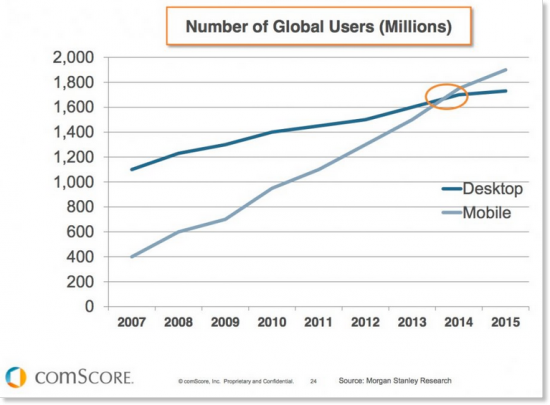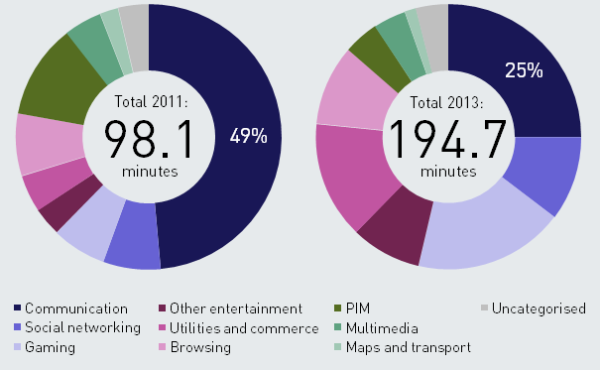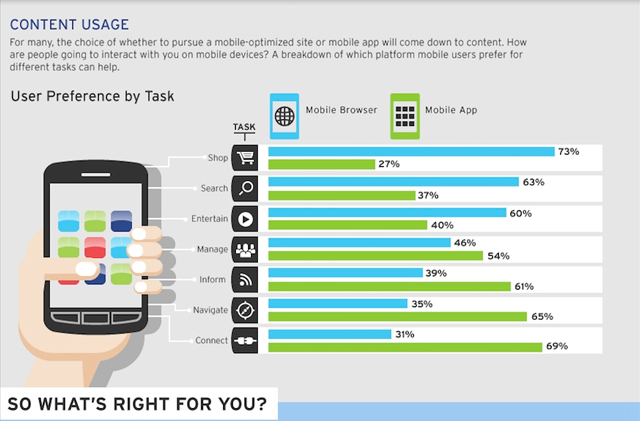Do you think it’s important for your business to invest in creating a mobile app and a responsive website? Let me give you some statistic so that you can decide.
Nowadays people spend twice as much time online compared to 10 years ago, increasing the usage of smartphones and tablets.
- 80% of all online users have a smartphone
- 50% of mobile phone users use mobile as their primary Internet source
- 80% of time on mobile is spent inside apps
- 72% of tablet owners purchase online from their tablets each week


Statistics are telling us that young people are spending more than two and a half hours using their smartphones. Do you believe that or not? Just look around you and watch the people travelling in the tube, walking on the streets or drinking beer in the pub. I’m sure you will see that a big percent of them are looking at their smartphones. It’s a little bit sad that the people start socialising using Internet and not face-to-face but good or bad – that’s the reality.
So what do we spend all that time doing?
Although it’s called a mobile phone, the actual usage of the mobile device to call people is the sixth most used function after other activities such as checking social media, news and gaming. In our daily life we use our smartphones for chatting, socialising, entertaining, informing, navigating, shopping and many other activities. Most of the people don’t even need an alarm clock and no longer wear a watch, as their mobile phone gives them everything they need. We are so addicted to using our phones that sometimes it feels like you cannot survive without it.

I think you understand now how important is to have a responsive website and an app. The question is which type of mobile presence is best for your business? Or should you have both? Both mobile websites and mobile apps let customers reach people but there is difference between them. The mobile website makes the regular website accessible for mobile users. Usually it has the same features as the regular version of the website like look, feel and content, but it has mobile-friendly design. In most of the cases, the mobile app functions like a mobile website, but it has its advantages. As users have to download and install the app, businesses have more control over their presence on a device than they would with a mobile website.
The question that many companies have is “do we really need an app?”. A lot of them decide to have only a responsive website instead of investing some money in creating an app. Probably you think “it’s not worthing, why should I invest money in that”. Probably you think that most of the people who have smartphones are only browsing through the web and they don’t use so many apps.
Think about that again. Do you use an Facebook app or you go the Facebook website though the browser? What about Gmail, Twitter, Google Maps, Citymapper and many other apps that you have installed on your smartphone. Now think of why you are actually using these apps instead of visiting their websites. Some of the reasons are because it’s faster, it looks better and the navigation is easier. Imagine what effort it takes to visit Facebook website though your phone’s browser. You need to open your browser, type the url, wait until it loads. After that you need to log in and wait again to load the page. Well, depending on your internet connection this could take a minute or 2. What about the app? How difficult is to open your activity feed. Well the good news is that it takes only 1 click. There is another good reason for a user to have your product app installed – the offline regime. In the big cities people are spending average hour and a half in the tube without Internet access. Some of the commuters are reading books, but most of them are using their mobile phones for entertaining. If there were no apps all these people wouldn’t be able to use their smartphones during the commute.
Everything seems great but probably you are wondering how your app is going to implement this offline functionality and is it possible to be applied to your app. Of course it depends on the requirements and the purpose of the app, but let me explain you how offline regime works.
Offline architecture means structuring your content in such a way that when a user doesn’t have an internet connection, they don’t get a blank white screen from your web app. Instead, they can interact with the app, and data will sync up to a server when a connection is available.
Still not convinced? Think now about people engagement.
Mobile apps give businesses the opportunity to interact with customers in real time with valuable information on location and other demographics through user profiles. You can send push notifications to the user promoting new features or informations about special offers and discounts.
Marketing research has shown that customers perceive companies that offer mobile apps more positively than those that don’t. An app can make your business stand out, which will help you build relationships with customers. Aside from promoting your brand, an app can also help you feature products and services. For instance, if you own a clothing store and have an app that provides user location information, you could send a time-sensitive voucher for an item to customers near the store to encourage them to walk in. Effective business apps produce an engaged customer, which usually translates into a paying customer.
Choosing between a responsive website or a native app is more of a business call than going into the technical details of what each platform has to offer.
For companies apps are another way to reach out customers, just like a website or an advertisements. There is no debate about one vs. another. The fact is you need both to get to your customers who are browsing on their desktops or on the go. The app can engage them so they keep coming back to your brand for more.


The current Web is “pull-based,” meaning we visit websites or download mobile applications. The future of the Web is “push- based,” meaning the Web will be coming to us. In the next 10s years, we will witness a transformation from a pull-based Web to a push- based Web. When this “Big Reverse” is complete, the Web will disappear into the background much like our electricity or water supply.
In the future, content, products and services will find you, rather than you having to find them. Instead of visiting a website, we will proactively be notified of what is relevant and asked to take action. The dominant function of the Web is to let us know what is happening or what is relevant, rather than us having to find out. All of this is already happening. To help your company be part of this “push-based” system,not to miss out on a huge potential audience and to be successful it’s strongly recommended to have a company app.





